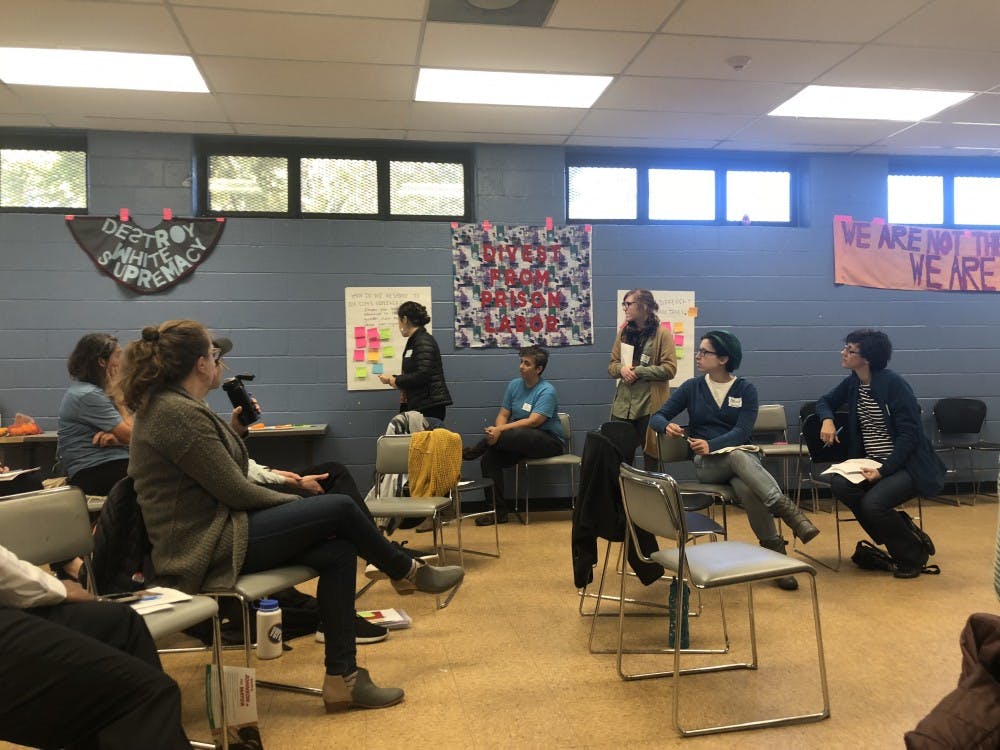Baltimore Ceasefire 365, a movement that aims to decrease Baltimore’s homicide rate, hosted a workshop titled “Beyond 911: Exploring Anti-Racist Routes to Community Safety” on Sunday at the 29th Street Community Center. Showing Up for Racial Justice (SURJ), a national organization that works to promote racial justice and end white supremacy, co-hosted the workshop.
Ceasefire planned the workshop and other events, including peace walks and job training, as a part of Ceasefire Weekend, which occurs four times a year and encourages people not to commit gun homicide for 48 hours.
The workshop focused on alternatives to policing in promoting community safety.
Lorie Benning, one of the organizers of the workshop and senior biostatistician at Hopkins, said that she believes that Ceasefire events have a positive impact on Baltimore because they promote an end to gun violence from within the community.
“Ceasefire is a self-determination peace movement,“ she said. “It is all about meeting people where they are and helping them figure out ways to resolve conflict.”
Topics of discussion at the event included the history of police brutality, legislative steps toward police accountability in Baltimore and non-police community safety resources.
Maura Dwyer, an organizer and member of SURJ, believes that people all over the city listen and respond to the Ceasefire events.
“Ceasefire is a transformational program where we find out how we are accountable to people of color in the city and what our role is,” Dwyer said.
Harriet Smith, the executive director of the Baltimore Harm Reduction Coalition (BHRC), an organization which promotes public health in the city, participated in the event. Smith explained that when she worked as a case manager in drop-in centers which provided services for people experiencing homelessness, she would try not to involve the police unless someone explicitly requested them.
Smith then addressed the University’s proposal to create a private campus police force. She explained that she would be suspicious of a private police force because of the University administration’s lack of transparency on the subject.
“Several folks are very concerned that they are trying to push it through without community dialogue and impact assessment,” Smith said.
On the other hand, Benning thinks that the Hopkins administration is taking the proper steps to address the opposition to the potential private police force. She believes the issue is complicated because many community members and students have protested the proposal.
“What the leadership is doing is the right way to go about it,” she said. “They are researching as well as inviting experts and the community to be part of the conversation. It seems to be that it is going to happen.”
Hopkins alum Haley Deutsch attended the workshop. She believes that Ceasefire events help bring the Baltimore community together.
“Having events where the whole community comes together and people can meet face-to-face is helpful. But I think that also having that positive energy out there is healthy for the city to have an outlet and have a movement to come together that is anti-violence,” Deutsch said.
She added that based on her knowledge of the communities surrounding the University, she does not believe that a private police force will be beneficial.
“I recognize that there are safety concerns on campus from the students and faculty as well,” Deutsch said. “But I don’t believe that they should have a private police force, particularly with the secrecy that they have going about it, and since they haven’t involved the community in making those decisions.”
Baltimore citizen Steph Schreckinger explained that although this was her first time attending a Ceasefire workshop, she believes these events are beneficial because they suggest strategies to decrease violence and provide information on resources other than the police.
“These events are good for awareness and getting people together to make sure that, even as individuals, there are ways that we can connect to help promote safer spaces for all people,” she said.





